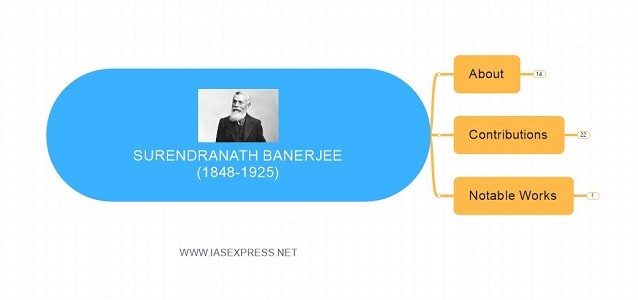Surendranath Banerjee – Important Personalities of Modern India

Prelims Sureshots » Important Personalities of Modern India
Surendranath Banerjee (1848-1925) also called Rashtarguru was a renowned Indian nationalist, political leader, public speaker, orator, teacher and writer. He was one of the founding members of the Indian National Congress (INC) and was one of the senior leaders of the organization. He belonged to the Moderate clan of INC and was one of the earliest leaders to fight for the cause of Indians under British rule and put forward their demands.
Early life and education
- Surendranath Banerjee was born on 10 November 1848 in Calcutta into a distinguished family of Kulin Brahmin Hindus.
- His father’s name was Dr Durga Charan Banerjee. He practised as a physician. Banerjee was the second son of his parents.
- Surendranath received his school education at a Parental Academic Institution which was attended chiefly by Anglo-Indian boys and at the Hindu College.
- In 1868, he graduated from the University of Calcutta (Doveton College) with a degree in English literature.
- In the same year, he travelled to England to appear for the Indian Civil Service examinations.
- He succeeded in the examination in 1869 but due to a dispute over his exact age, he was declared disqualified.
- After clearing legal disputes in court regarding the matter, he appeared for the examination again in 1871 and qualified for it.
- He was then appointed as Assistant Magistrate in Sylhet (now in Bangladesh).
- However, in 1874, he was dismissed from the service for a minor and inadvertent procedural error.
- Owing to his dismissal from the service, he was not even admitted to the bar.
- According to Banerjee, he was discriminated against for being an Indian and he went to England to protest against this decision but was unsuccessful.
- During his stay in England, Banerjee studied Burke and many other liberal philosophers.
Political career
- In 1875, Banerjee returned to India and set up his career as a Professor in English.
- Banerjee soon embarked on a political career to organize Indian public opinion, redress wrongs and protect rights, and give Indians a serious role in the administration of their country and be a voice in the counsels of their government.
- In July 1876, he founded the Indian National Association, the first Indian political organisation of its kind that presented the idea of India as a political unit.
- In 1878, he founded the English-language newspaper, The Bengalee, through which he espoused liberal causes for nearly half a century and was soon arrested for publishing certain remarks.
- After his release from prison, he initiated a movement for the creation of a “National Fund ” which was established at a meeting on July 17, 1883, to secure and expose the cause of political freedom in India through constitutional means.
- At the same time, the Indian National Association kept expanding considerably, and hundreds of delegates from across India came to attend its annual conferences in Calcutta.
- In 1885, Indian National Congress (INC) was founded in Bombay wherein Banerjee played a prominent role.
- Banerjee merged his organisation Indian Association with the INC, owing to their common objectives and memberships.
- Banerjee was a believer in moderate means of political agitation, meetings, petitions, and legislative action. He served as the President of INC in 1895 and 1902.
- He reached the climax of his political career in 1906 and then set in the decline of his political career. The clash between the Moderates and Extremists led to a decline of the Moderates of which Surendranath was the main pillar.
- It was because of the declining popularity of Moderate Indian politicians that Banerjee’s strata and popularity in Indian politics suffered a downfall.
- Banerjee was not in support of the idea of civil disobedience as proposed and advocated by Gandhi and criticised it.
- Banerjee supported the 1909 Minto-Morley reforms, which were resented and ridiculed as insufficient and meaningless by nationalist politicians and the vast majority of the Indian public.
- In 1913, he was elected to both the Bengal and imperial legislative councils.
- He also supported the Montagu-Chelmsford reforms of 1919 as substantially fulfilling Congress’s demands, resulting in Banerjee facing political isolation.
- He was elected to the reformed Legislative Council of Bengal in 1921 and knighted in the same year for his political support of the Empire.
- His acceptance of the portfolio as a Minister in the Bengal government was not received well by nationalists and much of the public.
- It resulted in Banerjee losing the election to the Bengal Legislative Assembly in 1923 and the end of his political career.
Major contributions
- As a nationalist
- Through his organization, the Indian Association he set the stage for a more practical demonstration of the newly awakened sense of political unity in India.
- He also used the organization to voice the grievances of Indians and intellectuals regarding the issue of age-limit for Indian students appearing for Indian Civil Service exams.
- He was one of the most important public leaders to protest against the partition of the Bengal province in 1905. It was because he was at the forefront of organizing protests and petitions that extensive public support across Bengal and India eventually compelled the British to reverse the bifurcation in 1912.
- Banerjee was an important figure in the Swadeshi movement, advocating goods manufactured in India against foreign products.
- Banerjee’s newspaper, The Bengalee, spread and wrote about liberal causes and nationalist viewpoints.
- As a teacher
- Banerjee as a teacher took full advantage of his profession to infuse the spirit of newly born nationalistic sentiments in the minds of his students.
- His eloquent public speeches on nationalist and liberal political subjects, as well as Indian history, such as ‘Indian unity’, ‘life and thought of Mazzini’ and ‘the history of Shivaji and the Sikhs’ led to a political regeneration.
- Banerjee played an important role in re-directing the Bengali youth’s interest and energy to national regeneration and nationalistic cause.
- He founded Ripon College, later renamed Surendranath College in Calcutta.
- As a social reformer
- Banerjee advocated widow remarriage and raising the marriageable age of girls.
- He also raised his voice against the racial discrimination practised by the British through his speeches all over the country.
- The Indian Association started by Banerjee tried to bring Hindus and Muslims together for political action.
Achievements
- Banerjee was the second Indian to pass the prestigious Indian Civil Service examinations.
- He is regarded as the pioneer leader of Indian politics for being the first one to lead the path of Indian political empowerment.
- His strong grasp of the English language, his eloquence and his skills as an orator and debater made him an outstanding public speaker and a master parliamentarian.
- He received a knighthood from the British in 1921.
- He is known as the “uncrowned king of Bengal” for his popularity in the fight against the British through the Swadeshi movement.
- He was also respected by his British opponents and was referred to as “Surrender Not” Banerjee in his later years.
- He was a true advocate of democracy. While serving as a minister in the Bengal government, Banerjee made the Calcutta Municipal Corporation a more democratic body.
Death and literary work
- Surendranath Banerjee breathed his last in Barrackpore on August 6, 1925.
Literary work: A Nation In Making (1925)


